






























Welcome to our issue of the Make It Kenya-China Edition Magazine where our focus is on the promising China market. This Publication takes an indepth look at Kenya’s exports and bilateral relations with China. Kenya’s exports to China had notable changes in 2023. Kenya’s exports to China totalled $283 million, indicating a strong commercial connection. Titanium ore, valued at $103 million, ores of niobium, tantalum, vanadium, and zirconium, valued at $41.5 million, and manganese ore, valued at $15.6 million, were among the major exports. Furthermore, Kenya’s exports of avocados to China saw a sharp rise, going from 443.6 tonnes in 2022 to 4,324.1 tonnes in 2023, a nearly tenfold increase according to data from the observatory of economic complex.
China, officially known as the People’s Republic of China is home to over 1.4 billion people. It is in East Asia and is the largest of all Asian countries. China has the largest population of any country in the world. It is well known for its innovative and manufacturing capacity. China’s capital city is Beijing, whilst the most popular city and largest financial center is Shanghai. Hong Kong is the leading commercial center and port of the country.
Kenya seeks to diversify her Chinese market by focusing on value addition of products such as flowers, avocados, vegetables, tea, coffee and mangoes to increase her export trade.
To enhance the better understanding of trade relations with China, the issue will focus on Kenya’s trade and opportunities in the populous and promising market.
Enjoy the read and keep choosing Kenya ! .
Mr. Jaswinder Bedi, EBS, MBS - Chairman
Mr. Ambrose R.M. Ogango
Director - Alt. to PS, The National Treasury
Ms. Leah Aywah Baraza
Director - Alt. to the Attorney General
Mafaka Michael Ngugi Karanja
Independent Director
Mulki Warsame Mohamed
Independent Director
Dr. Grace Kinya Muriithi – Kireria
Independent Director
Floice Mukabana - Chief Executive Office

EDITOR IN CHIEF:
Maureen Mambo- MPRSK
EDITORS: Joane Wanjala
Jonah Karanja
CONTRIBUTORS: Jonah Karanja
DESIGN & LAYOUT: Walter Kelvin Otieno

China is a priority market for Kenya and the Kenya Export Promotion and Branding Agency and the government of Kenya are working together to enhance market linkages to China.

Floice Mukabana CEO KENYA EXPORT PROMOTION AND BRANDING AGENCY
Kenya and China bilateral trade relations
Several sectors are covered under the existing diplomatic cooperation agreement between Kenya and China. On December 14, 1963, the People’s Republic of China and the Republic of Kenya established diplomatic ties. Starting with the Ming Dynasty, Kenya and China’s diplomatic ties have a rich historical background. Kenya has been a major target of China’s commercial and economic policy in Africa because it is seen as a gateway to the East, central and sub-Saharan Africa.
China’s involvement in several road construction projects in Kenya is among the milestones that the two nations have accomplished. Additionally, China is now providing financing to Kenya for the development of hospitals and schools in less developed areas, has established malaria prevention and control centers, and is sending volunteers to train the locals. Kenya is keen on increasing her export products to China. Besides exporting coffee, tea, flowers and minerals, Kenya has started exporting avocados to China much to the relief of avocado farmers. Kenya Export Promotion and Branding Agency (KEPROBA) and Kenya Plant Health Inspectorate Service (KEPHIS) facilitated the coming of Chinese Phytosanitary officials who tested some varieties of avocados in Kenya.
Kenya’s avocado exports to China have increased dramatically over the past few years, leaping from 443.6 tons in 2022 to an incredible 4,324.1 tons in 2023. This is a major turning point for Kenya’s agricultural exports.
Kenya is also keen on increasing tea exports to China. According to the Tea Directorate, tea accounts for around 23% of all foreign exchange revenues in Kenya. The 53-million-person East African nation produces more than 450 million kg of tea yearly. Kenya’s tea industry directly and indirectly employs about 5 million people.
China is a priority market for Kenya and the Kenya Export Promotion and Branding Agency and the government of Kenya are working together to enhance market linkages to China. This culminated in the sending of envoys to scout for new markets for a variety of products from Kenya.

1.4 BILLION
9.597 million km²
USD 17734.06 billion 2021
China, officially known as the People’s Republic of China is home to over 1.4 billion people. It is located in East Asia and is the largest of all Asian countries. China has the largest population of any country in the world. It is well known for its innovative and manufacturing capacity. China’s capital city is Beijing, whilst the most popular city and largest financial center is Shanghai. Hong Kong is the leading commercial center and port of the country.
China is a unitary socialist republic. It is led by the Chinese Communist Party (CCP). The current reigning president is Xi Jinping, who is also the CCP General Secretary. Up until 1949, China was first ruled by dynasties who were hereditary monarchies. This was followed by a long time of political instability and war which trickled into World War II. This in turn hurt China’s economy as a country along with its citizens.
The Gross Domestic Product (GDP) in China was worth 17734.06 billion US dollars in 2021, according to official data from the World Bank. The GDP value of China represents 7.94 percent of the world economy. China has been able to pick itself back up with strict policies and reforms which saw more than 800 million people come out of extreme poverty. Other developments also cropped up in areas such as Health, Education and Manufacturing. China makes up 28.7% of the total global output for manufacturing.
China has become one of the fastest growing major economies and is undoubtedly the world’s largest manufacturer and exporter. This could be attributed to;
• The huge number of laborers/workers available and paid low wages.
• Chinese manufacturers operating under a much more permissive regulatory environment than its universal competitors.
• An expansive network of suppliers and distributors who ease the trader’s process.

China has slowly evolved into a highly diversified economy and one of renowned affiliate players in international trade. ‘‘

Mandarin is the official language of China. There are as many as 292 living languages in China. Some of these languages are Mandarin in the northern, central, and western parts of China and Cantonese (Yue) in the southeastern part of the country. Cantonese is actually spoken by more than 55 million people in Guangdong and southern Guangxi provinces of China, not forgetting the cities of Canton, Hong Kong, and Macau.
China has slowly evolved into a highly diversified economy and one of renowned affiliate players in international trade. China has been able to master their hand in; manufacturing, retail, e commerce and electronics (technology) just to name a few.
China is also the largest producer of rice, a well-known accompaniment to a lot of meals in the country. In recent years, China has seen increase in imports of soybean, crude oil, cotton just to name a few.
China is also given credited to the highly acclaimed Four Great Inventions. The Four Great Inventions are Papermaking, printing, gunpowder and the compass which can be dated back in ancient China.
China was the first country to invent paper as most countries were acclimated to using; grass stalks and even earthen plates to relay information. This method of using paper went on to spread in Korea, Japan and America by way of Europe.
Printing came about by the practice of engraving writing or pictures on a wooden board, smearing it with ink and then printing on pieces of paper. Gun powder was also discovered by the realization that an explosion could be induced if certain kinds of ores and fuel were mixed in the right proportions and heated. The compass came to be that while mining ores and melting copper and iron; people chanced upon a natural magnetite that attracted iron and pointed fixedly north. After constant improvement, the compass finally came to be.
All these practices became widespread across East Asia, the Middle East and Europe; a testament to China’s trail blazing capacity. At present, China is a country headed towards success within the Asia and in international trade.
By Jonah Karanja

By Jonah Karanja I jkaranja@brand.ke
Kenya’s avocado exports to China have increased dramatically over the past few years, leaping from 443.6 tons in 2022 to an incredible 4,324.1 tons in 2023. This is a major turning point for Kenya’s agricultural exports, with increased logistics and smart market entrance initiatives credited for the impressive development.
Kenya started sending fresh avocados to China for the first time in August 2022, opening up new export markets. As seen by the nearly tenfold increase in export volume in only a single year, the initial venture’s success cleared the path for exponential development. In 2023, Kenya shipped 4,324.1 tons of avocados to China, according to the General Administration of Customs in China.
Kenya became the first African country to export fresh fruits directly to the Chinese market after Beiing opened its doors to 15 Kenyan farms that met the required regulations. Kenya and China in January 2022 signed two protocols aimed at fostering trade in aquatic products and avocados a move that will greatly impact the farmers income and Kenya’s economy. Under this protocols, Kenyan Avocados received the green light to penetrate the Chinese market after meeting the phytosanitary standards set by Chinese regulators. The General Administration of Customs of China and Kenya Plant Health Inspectorate Service (KEPHIS) are involved in the certification of safety and quality of the Avocados before their export to China.

The Kenya Export Promotion and Branding Agency (KEPROBA) has been in the forefront when it comes to linking Avocado farmers to new markets. In March 2019, KEPROBA facilitated China Phytosanitary Inspectors to come to Kenya to undertake Pest Risk Analysis (PRA. The inspectors were taken to Sunripe Naivasha to witness the processing of frozen avocados. The firm met the required standards and as a result, Kenya became the first African nation to export frozen avocados to China.
Kenya’s export logistics heavily rely on the Port of Mombasa, which is the largest port in East Africa. With the goal of making Kenyan exports more competitive, the Kenya Ports Authority (KPA) is investigating creative ways to lower the cost of transportation from different regions of Kenya to the port. One noteworthy project is the collaboration between KPA and the Acacia farm of Vertical Agricultural Group, which entails transporting avocados in chilled containers during the primary production season. This partnership offers a more effective and economical shipping option by
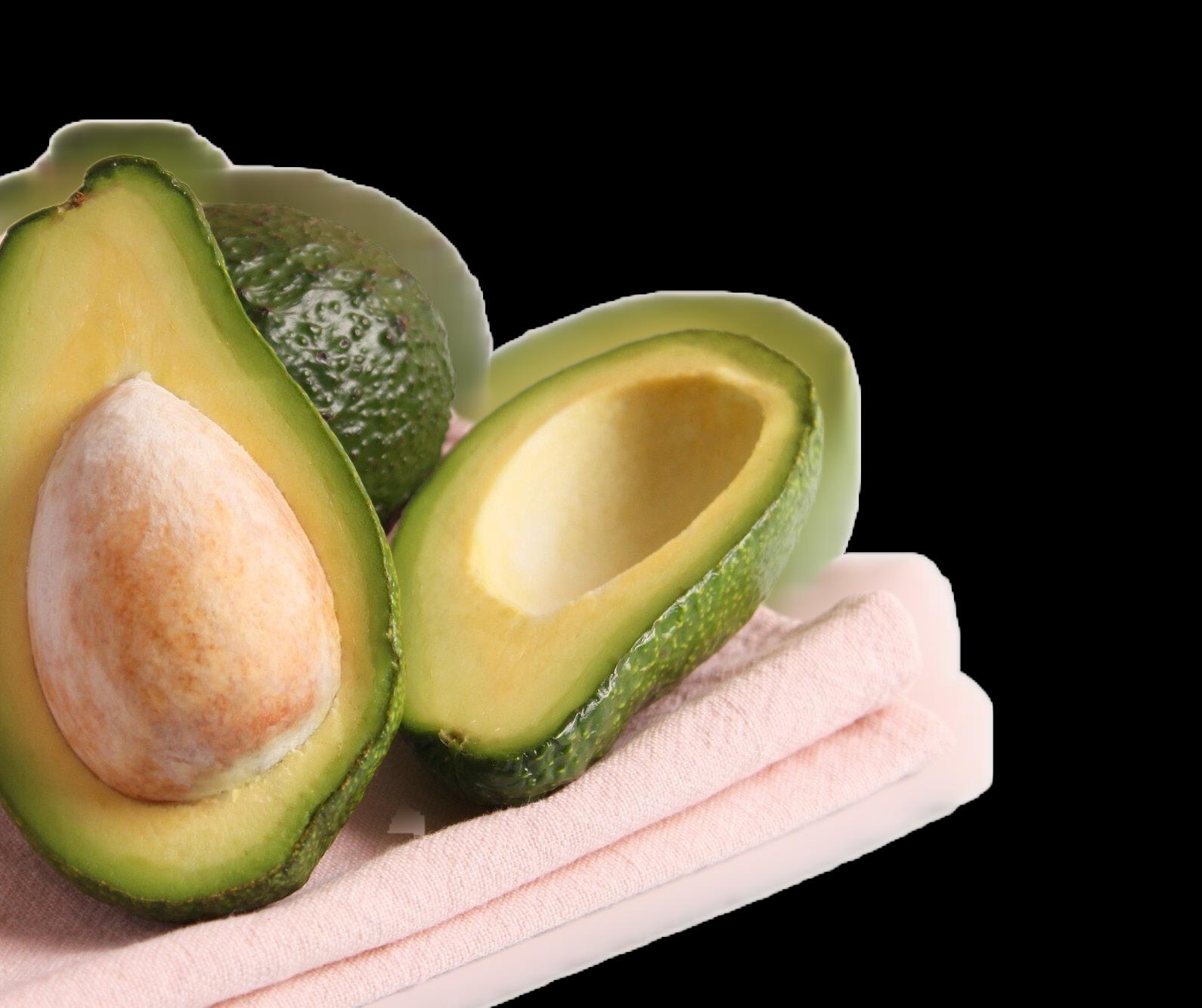
The General Administration of Customs of China and the European Union have certified Sunripe and Vertical Agricultural Group’s Acacia farm, enabling the export of Kenyan avocados to China, Europe, Canada, and the Middle East. These credentials are vital for meeting the high
major season, which runs from March to September, and the minor season, which runs from November to January, are when avocados are produced in Kenya. Because avocados are perishable and have a limited export window, the minor season produces fewer amounts and typically necessitates air transportation. Sea transport, on the other hand, becomes feasible during the major production season, greatly lowering logistics costs and raising the price and competitiveness of Kenyan avocados internationally.
The rising consumer demand for wholesome, fresh produce, has stamped China as a significant market for Kenyan avocados. The inclination of the Chinese market towards mixed avocado sizes offers Kenyan exporters a chance to accommodate a range of tastes. Although most of Kenyan avocados are still exported to Europe, there has been a significant change with the sharp increase in shipments to China. Around 3,500 tons are exported during the primary season, highlighting the growing importance of the Chinese market for Kenyan farmers.
The surge in avocado exports to China underscores the potential for further growth. By continuing to improve logistics and maintaining high-quality standards, Kenya can solidify its position in the global market. The strategic use of refrigerated containers and reduced transportation costs are crucial for enhancing the competitiveness of Kenyan avocados. As logistics improve and market demand grows, the future looks bright for Kenya’s avocado industry. The Kenya Export Promotion and Branding Agency attributes the success in avocado exports into China to increased corporation between the farmers and different government agencies. Kenya’s success in China can serve as a model for other agricultural sectors, focusing on logistics improvements and market-specific strategies to boost exports and contribute to the country’s economic growth.

CBy Jonah Karanja I jkaranja@brand.ke
hina is one of the world’s fastest growing major economies. It has become a force to reckon in international trade with its strength lying in manufacturing and retail, but to name a few. Its interest in African countries has also risen over the years with Kenya becoming a benefiter of the initiatives planted to profit our country’s economy.
Kenya’s economy is well known to have the Agricultural sector as its driving force. This is mainly due to Kenya’s manpower largely stemming from the rural areas where climate is conducive for farming to occur. Kenya’s major agricultural exports are Tea, Coffee, Cut Flowers and vegetables and recently, avocados.
Kenya is graced with great trade relations amongst most African countries as well as international traders such as China, Europe and the United States. Through the recent years, we have witnessed trade between Kenya and China strengthen with export breakthroughs occurring on Kenya’s end.
These occurrences have led to Kenya having improved bilateral relations with China over the years. It brings no surprise that China is Kenya’s primary trading partner. Kenya’s exports to China had notable changes in 2023. Kenya’s exports to China totalled $283 million, indicating a strong commercial connection. Titanium ore, valued at $103 million, ores of niobium, tantalum, vanadium, and zirconium, valued at $41.5 million, and manganese ore, valued at $15.6 million, were among the major exports. Furthermore, Kenya’s exports of avocados to China saw a sharp rise, going from 443.6 tonnes in 2022 to 4,324.1 tonnes in 2023, a nearly tenfold increase according to data from the Observatory of Economic Complexity.
Kenya marked its first monumental trade success in April 2019 when President Xi Jinping signed a deal allowing Kenya to export Hass avocados to China. Kenya then became the first African country to export avocados to China. The governments overarching Vision 2030 is to make Kenya globally competitive and give the nation along with its citizens, high quality of life.
Kenya is currently seeing an increase and need of domestic exports that include titanium ores and Zirconium ores accounting for 60% of Kenya’s export. They are followed by Niobium, Tantalum, Vanadium and Iron Ore. Vegetable textile fiber (not spun), petroleum oils, hides and skins of bovine or quine, in wet state, sesame seeds and black tea, are also coming in but with a fickle growth in the past five years.
There are other products which could thrive in the Export market including Fermented and partly fermented black tea, fresh cut roses, flowers and buds, avocados, tanned or crust skins of sheep or lambs, without wool on, other natural gums, resins, gum-resins, Copperzinc base alloys (brass) but to name a few.
Kenya Export Promotion and Branding Agency, working alongside the government; aims at diversifying and open Kenya’s export market while giving Kenyan vendors and farmers trade opportunities simultaneously. Initiatives such as Made in Kenya give a spotlight to quality products and services being sold both locally and on an international level. With China taking the lead on trade partnerships within the country, our mandate is to then uphold guidelines and set in place structures to ensure the right quality and standard in export products is met. This will see Kenya’s exports meeting the needs of every Chinese consumer.

By Jonah Karanja I jkaranja@brand.ke
The relationship between Kenya and China is multifaceted and dynamic one that has evolved significantly over the years. China-Kenya ties can be traced back over 600 years, when the fleets led by the great Chinese navigator Zheng He, who visited Kenyan coast four times, bringing silk, porcelain and friendship. China became the first country to establish diplomatic relations with the republic of Kenya. These formal establishment happened after the Kenyan gained its independence on December 14th, 1963. After independence China became the fourth country to open an embassy in Nairobi.
Since then, the two parties have had a shared history of friendship that has lasted into modern times, according to the Chinese State Councillor and Foreign Minister Wang Yi.
Besides the political ties, the two countries have developed a strong economic and it’s evident that in the recent years the two countries have signed some trade deals. The trade between the two countries has evolved over years, that is from the pre-Kenya independent era, the colonial era when Kenya was ruled by the British Empire and the Cold War era into the modern-day trade.
Here’s an overview of the relations between China and Kenya:
China is Kenya’s largest import source accounting for approximately 17.6% that amounted to 3.27 billion US Dollar in 2023 according to data from Trend
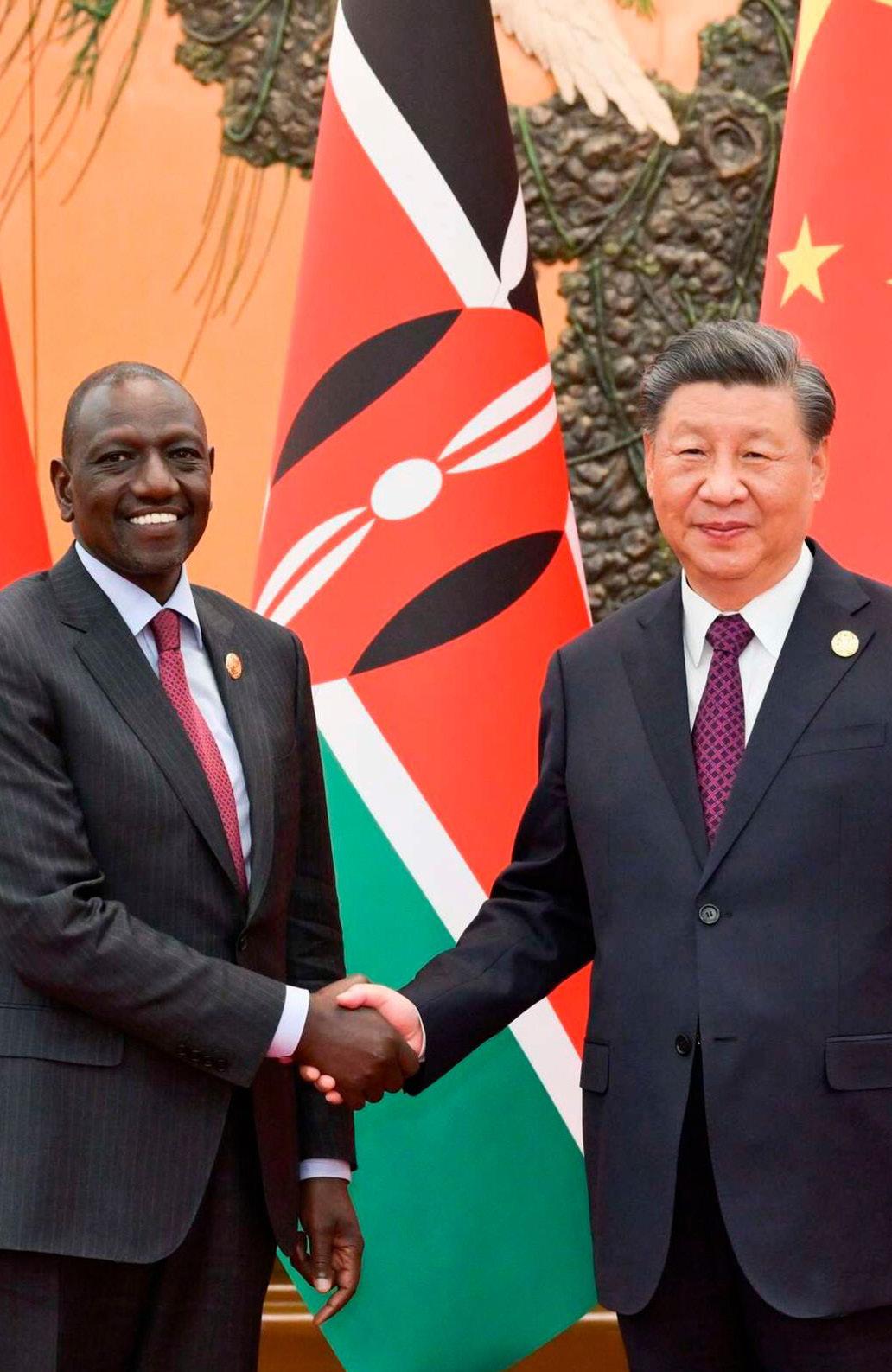
Economy. The Asian giant is a significant trading partner and a major source of the foreign investment, with bilateral trade rising rapidly. The trade between the country has significantly grown in the recent years. In 2020. The trade volume between the two countries has been steadily increasing, with China exporting a wide range of goods to Kenya. Here are the trade and investment relations between the two countries, a.Trade volume: The trade volume between the two countries has increased steadily. The trade balance has been in China’s favour, with Kenya importing more goods from China than it exports. Chinese exports to Kenya include machinery, electronics, textiles, vehicles, and consumer goods, while Kenya exports products such as tea, coffee, horticultural produce, and minerals to China. In the last 26 years the exports of Kenya to China have increased at an annualized rate of 21.8%, from $1.2M in 1995 to $202M in 2021. On the other hand, the exports of China to Kenya have increased at an annualized rate of 16.7%, from $104M in 1995 to $5.81B in 2021.
b. Infrastructure projects: China has been actively involved in financing and constructing major infrastructure projects in Kenya. Some of the projects include the Standard Gauge Railway (SGR) was completed with substantial Chinese investment and expertise. China has also been involved in the construction of roads, ports, and other major infrastructure projects in Kenya. Another project is the Nairobi- Thika highway. This project started from 2003 to 2013 which was completed with the help of the Export – Import bank of China. The project has improved the mobility of people and has linked East Africa to Mombasa, the region’s largest port.
c. Investment: Chinese companies have invested in various sectors, including manufacturing, real estate, energy, telecommunications, and agriculture. These investments have contributed to job creation, technology transfer, and economic development in Kenya.
d.Special Economic Zones (SEZs): China has supported the establishment of Special Economic Zones in Kenya, aimed at attracting foreign investment and promoting industrialization. Chinese companies have shown interest in setting up manufacturing plants in these SEZs, contributing to Kenya’s efforts to diversify its economy and create employment opportunities.
e. Small and Medium Enterprises (SMEs): Chinese investment and trade have also impacted the growth of small and medium enterprises in Kenya. Many Kenyan entrepreneurs import goods from China for resale, contributing to the development of the local retail sector.
f.Belt and Road Initiative (BRI): Kenya is one of the countries participating in China’s Belt and Road Initiative. The BRI aims to enhance connectivity and promote trade and investment between China and countries along the ancient Silk Road routes. The BRI has also aligned its vision and mission with that of the African Union’s agenda 2063 and specific vision of countries such as Kenya’s Vision 2030. In Kenya, through the BRI, China has supported modern infrastructure projects through the BRI, such as railways, expansion of roads, construction of ports, dams, industries, digital connectivity, and airports, all of which injected vitality into the country’s economic and development growth.
g.Key Export Sectors: Trade between the two countries has significantly grown and widen for the second year in a row despite aggressive efforts by Nairobi to push Beijing to open its markets in refreshed export strategy in 2018. Official trade statistics show the difference between exports and imports grew to the highest levels since 2017 before Kenya made China the top target destination under Integrated National Exports Development and Promotion Strategy in July 2018. Kenya’s main exports to China include agricultural products, such as tea, coffee, flowers, and vegetables. Additionally, minerals, such as titanium and iron ore, are also exported to China.

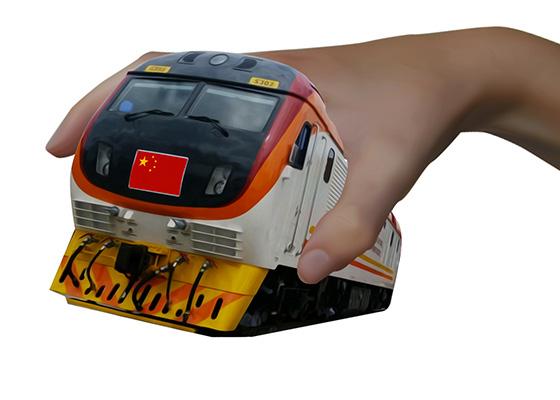

The year Kenya and China established diplomatic relations

In May 2024, China recorded exports worth $779 million to Kenya while importing goods valued at $17.9 million from Kenya, culminating in a trade surplus of $761 million. Compared to the previous year, China’s exports to Kenya saw a significant increase of $131 million (20.2%), rising from $648 million in May 2023 to $779 million in May 2024. Concurrently, imports from Kenya grew by $2.9 million (19.3%), up from $15 million to $17.9 million over the same period.
During May 2024, China’s leading exports to Kenya included Rubber Footwear ($24.2 million), Hot-Rolled Iron ($21.7 million), Non-Knit Women’s Suits ($17.1 million), Telephones ($16.7 million), and Synthetic Filament Yarn Woven Fabric ($16 million). On the import side, China’s primary imports from Kenya comprised Titanium Ore ($4.69 million), Niobium, Tantalum, Vanadium, and Zirconium Ore ($4.59 million), Manganese Ore ($1.49 million), Scrap Copper ($1.17 million), and Other Nuts ($1.03 million).
Kenya and China established diplomatic relations in 1963, shortly after Kenya gained independence. The two countries maintain a diplomatic presence through their respective embassies in Nairobi and Beijing.
China has provided development assistance to Kenya in the form of grants, loans, and technical cooperation. Assistance has been directed toward various sectors, including agriculture, health, education, and infrastructure. Chinese assistance has included the provision of agricultural equipment, medical supplies, scholarships for Kenyan students, and training programs.

Kenya and China have formed strategic partnerships in various sectors, including agriculture, manufacturing, technology, and finance. These partnerships involve collaboration in areas such as capacity building, knowledge transfer, and joint ventures, fostering long-term cooperation and mutual benefit.
In conclusion, the relations between Kenya and China have grown significantly in various areas with China becoming a major trading partner and investor in Kenya. However, concerns have been raised about the trade imbalance with Kenya seeking to promote more exports to China.. However, there are opportunities for increased collaboration such as exploring new sectors for investment and promoting value addition in Kenya’s exports. Despite the challenges, the relationship between the two countries continue to be of mutual benefit.
By Jonah Karanja I jkaranja@brand.ke
China, formally known as the People’s Republic of China (PRC), is located in East Asia. It is the world’s second-most populous country, with a population surpassing 1.4 billion. Covering an area of almost 9.6 million square kilometers (3,700,000 square miles), China is the third-largest country globally by total land area. The nation extends across five time zones and shares land borders with fourteen countries, tying with Russia for the most neighboring countries. It is divided into 22 provinces, five autonomous regions, four municipalities, and two special administrative regions (Hong Kong and Macau). Beijing serves as the national capital, while Shanghai is the largest city and primary financial hub. China holds the position of the second-largest economy globally, is the leading exporter, and possesses the largest foreign exchange reserves. Despite having one of the world’s fastest-growing GDPs, China’s economic growth significantly decelerated to 2.3% in 2020 from 6% in 2019 due to the COVID-19 pandemic. This slowdown in 2019 was part of a broader structural deceleration, as the country shifts from an investmentdriven growth model and the government enacts measures to mitigate financial risks.
China’s total imports have been growing at an average rate of 7.0% per year from 2018 to 2022. Between 2021 and 2022, imports rose by 1.5%, reaching a value of USD 2.7 trillion in 2022. The main source markets for China’s imports included Taipei, Chinese (USD 238.1 billion, 8.8%), South Korea (USD 199.7 billion, 7.4%), Japan (USD 184.5 billion, 6.8%), the United States (USD 179.0 billion, 6.6%), and Australia (USD 142.1 billion, 5.2%). In contrast, Kenya ranked 124th, contributing a minimal share of USD 0.3 billion, or 0.01%, to China’s import basket.

Source: International Trade Centre database 2023; Compiled by KEPROBA


Kenya’s trade relationship with China has seen significant growth over the past decade, characterized by a generally upward trend in exports and imports. The most notable year for Kenyan exports to China was 2022, when they reached a record high of USD 233.8 million. In contrast, the lowest export figure was recorded in 2013, at USD 48.8 million.
On the import side, Kenya’s purchases from China have generally increased over the decade, despite some fluctuations. The lowest import value was observed in 2013, amounting to USD 2.1 billion, while the highest was recorded in 2022, reaching USD 3.8 billion.
From 2013 to 2022, Kenya’s exports to China averaged USD 123.7 million annually, while its imports from China averaged USD 3.4 billion each year. This substantial difference underscores the trade imbalance between the two countries, which has consistently favored China throughout the decade.
The trade deficit has been particularly pronounced, with 2013 being the least unfavorable year for Kenya, with a trade imbalance of USD 2.1 billion. The most challenging year for Kenya was 2017, when the trade deficit peaked at USD 3.7 billion.
Overall, while Kenya has made strides in increasing its exports to China, the balance of trade remains heavily tilted in favor of China, reflecting the broader dynamics of Sino-African trade relations.
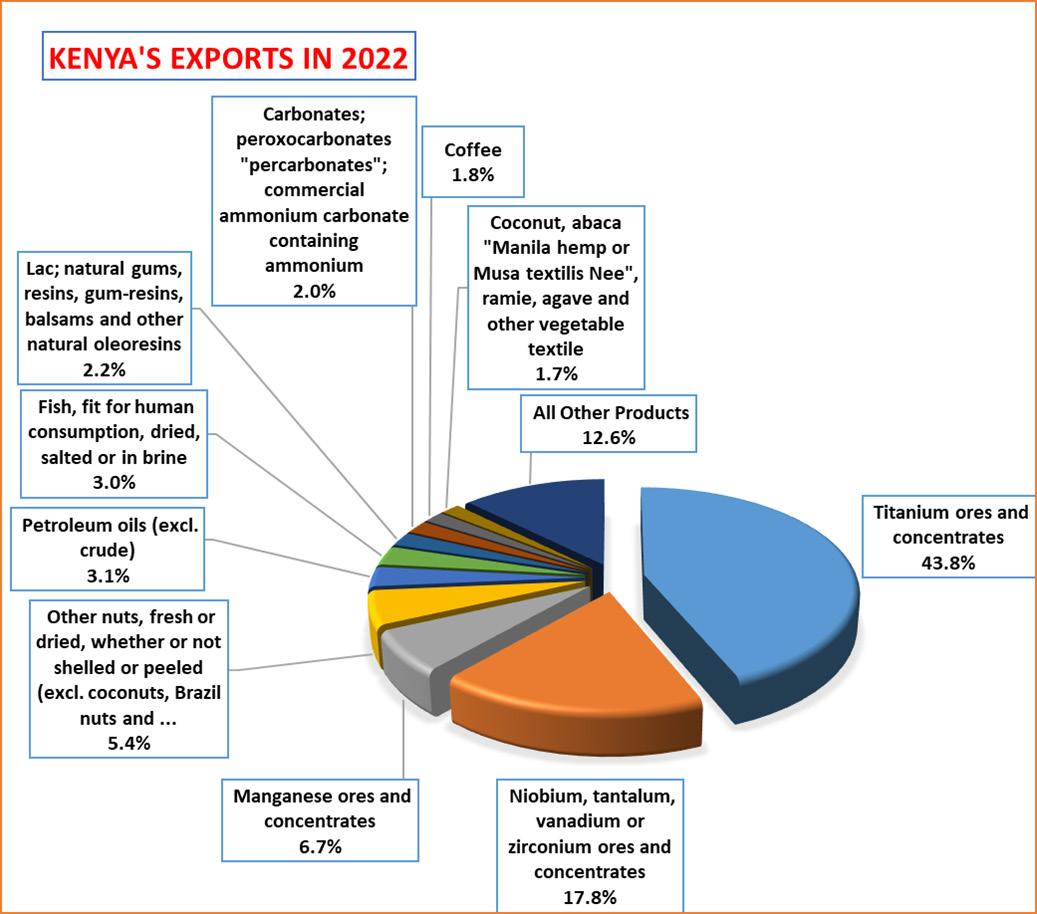
Source: International Trade Centre database 2023, Compiled by KEPROBA
In 2022, Kenya’s export value to China reached USD 233.8 million, showcasing a significant upward trend. Over the past few years, from 2018 to 2022, the average annual growth rate of Kenya’s exports to China has been an impressive 22%.

The principal export product from Kenya to China in 2022 was titanium ores and concentrates, which accounted for 43.8% of Kenya’s exports to the country. Following titanium ores, other notable exports included: Niobium, tantalum, vanadium, or zirconium ores and concentrates (17.8%) and Manganese ores and concentrates (6.7%).
These top five export products together constituted 76.7% of Kenya’s total exports to China, indicating a high concentration within the export basket.
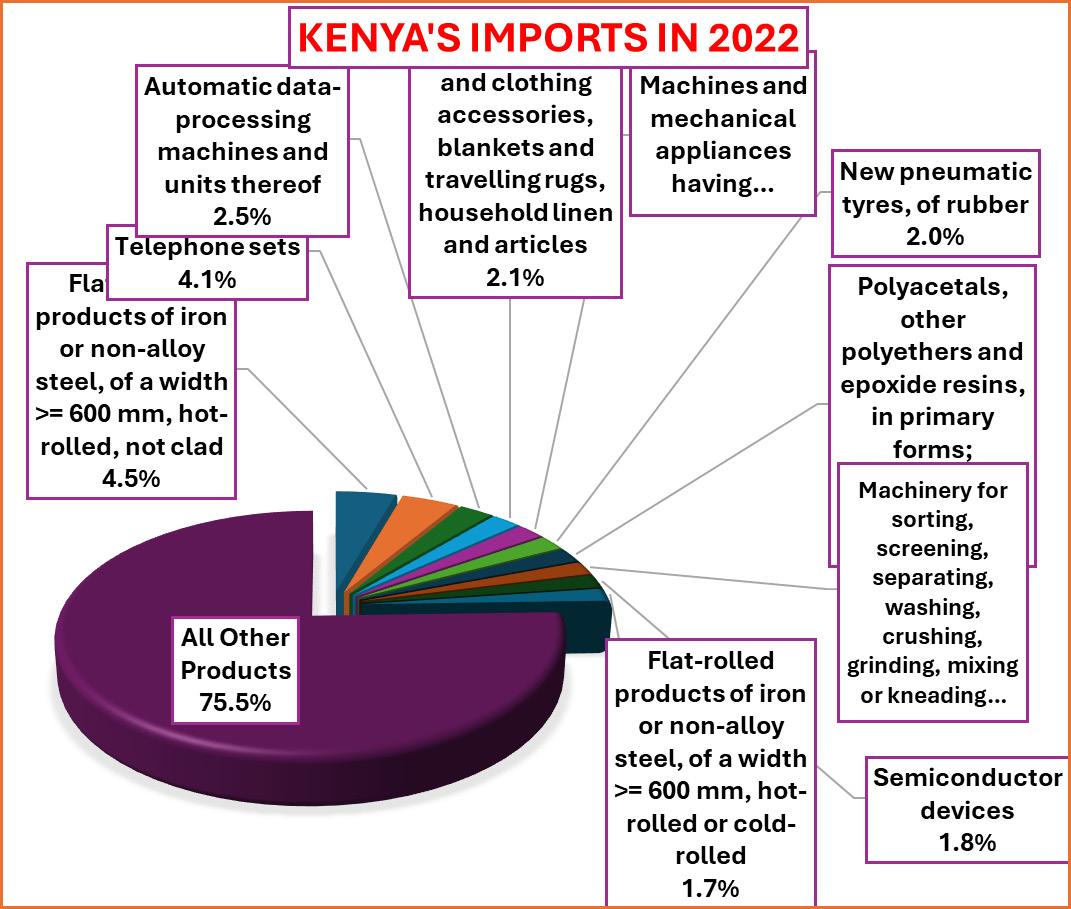
Source: International Trade Centre database 2023, Compiled by KEPROBA
In 2022, Kenya’s imports from China were valued at USD 3.8 billion. This figure represents a decrease of USD 182 million compared to the previous year, where imports stood at USD 4.0 billion.
In 2022, Kenya’s imports from China were valued at USD 3.8 billion. This figure represents a decrease of USD 182 million compared to the previous year, where imports stood at USD 4.0 billion.
Among the main products imported from China in 2022, flat-rolled products of iron or non-alloy steel, with a width of 600 mm or more, hot-rolled, and not clad, were particularly significant. These products alone were valued at USD 171.4 million, accounting for 4.5% of Kenya’s total imports from China.
The data highlights the importance of iron and steel products in Kenya’s import portfolio from China and reflects the overall trade dynamics between the two countries.

By analyzing the global demand in China for products that Kenya is already exporting worldwide, several potential new export products for Kenya to China have been identified. These products include vegetables, food preparations, avocados, pineapple juice, margarine, garments and footwear, soap, disodium carbonate, and crude oil.
Kenyan exporters face several general barriers that impact their ability to expand exports. These barriers include:
1. Lack of Capabilities: Deficiencies in skills, technology, design, competitiveness, and regulatory frameworks.
2. Financial Access: Limited access to finance for businesses.
3. Trade-Related Infrastructure: Insufficient infrastructure to support trade activities.
4. Market Access Barriers: Challenges related to meeting standards, labeling requirements, and tariffs.
These constraints highlight the need for targeted interventions to enhance Kenya’s export potential, particularly in the Chinese market, as detailed by Krishnan et al., 2018. Addressing these barriers can significantly improve the competitiveness of Kenyan products and facilitate their entry into new international markets.
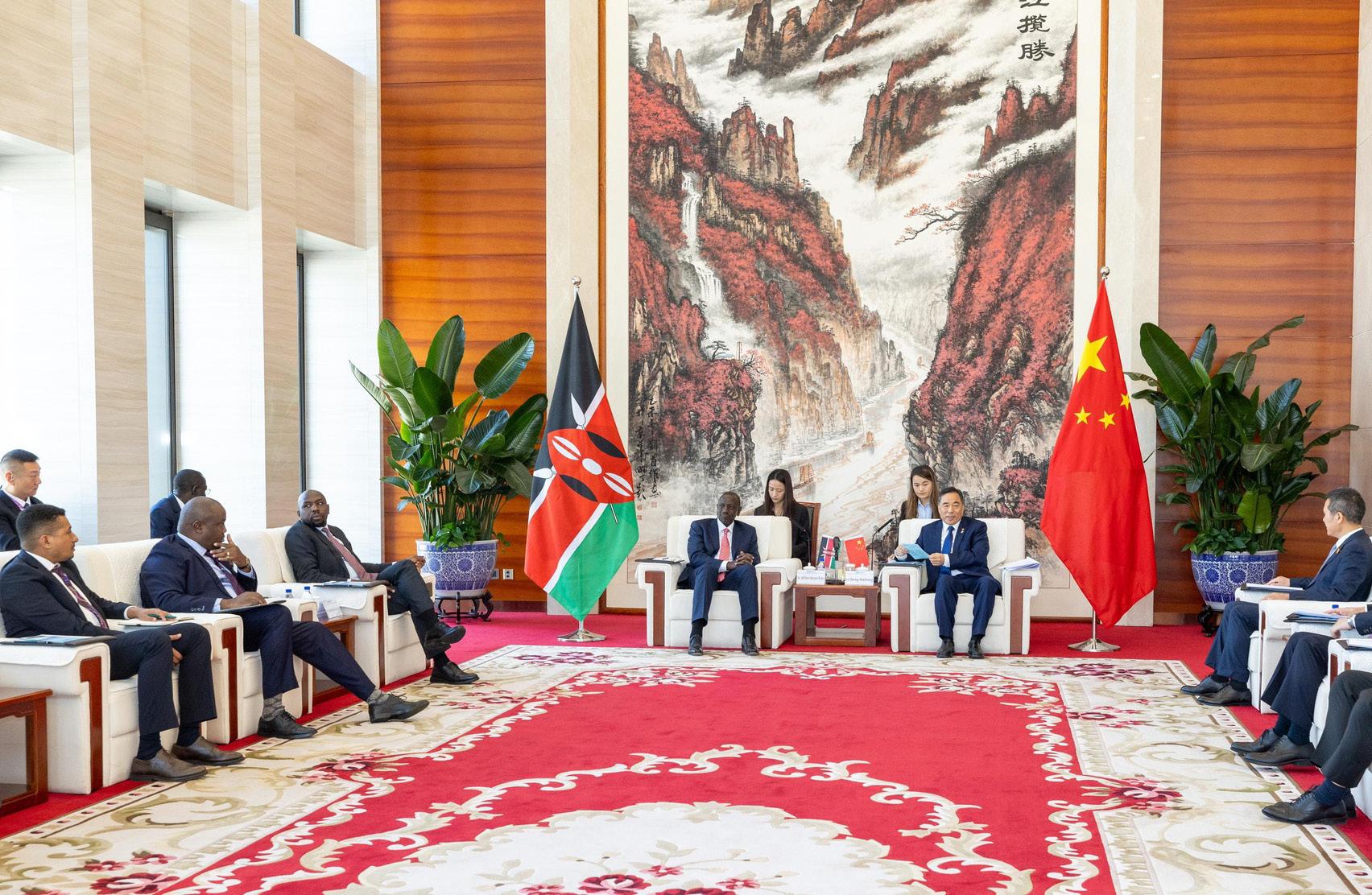
Potential new export products for Kenya to China vegetables, food preparations, avocados, pineapple juice, margarine, garments and footwear, soap, disodium carbonate, and crude oil.

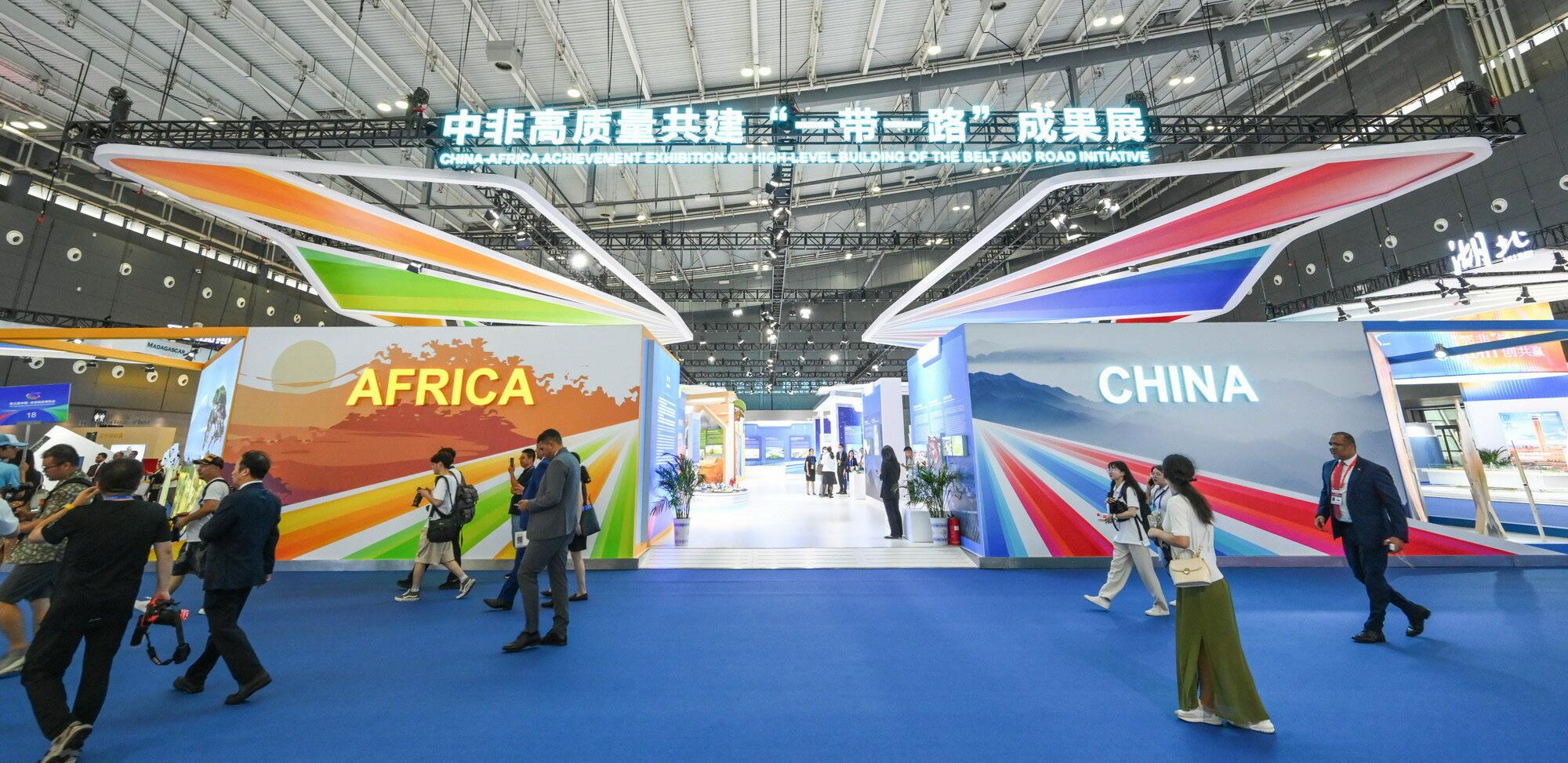
By Jonah Karanja I jkaranja@brand.ke
The China-Africa Economic and Trade Expo (CAETE), held from May 9th to 11th, 2024, at the Edge Hotel in South C, Nairobi, was a significant event organized by the Ministry of Investments, Trade, and Industry through the Kenya Investment Authority. This event was a collaboration with the Ministry of Commerce of the People’s Republic of China (MOFCOM) and the People’s Government of Hunan Province. It served as a follow-up to initiatives announced by China’s President Xi Jinping at the 2018 Beijing Summit of the Forum on China-Africa Cooperation (FOCAC), aiming to establish a platform for implementing economic and trade initiatives under FOCAC and fostering ChinaAfrica economic and trade cooperation at the sub-national level.
The Kenya Export Promotion and Branding Agency (KEPROBA) played a pivotal role in the planning and execution of the event as a member of the inter-ministerial planning committee. During the expo, KEPROBA actively participated with the primary objective of raising awareness about its services. The Agency focused on highlighting its mandate to develop and promote exports, as well as promoting the Made in Kenya identity mark.
By participating in CAETE, KEPROBA aimed to foster stronger economic and trade ties between Kenya and China, ensuring that Kenyan products gain greater visibility and recognition in the Chinese market. The Agency’s involvement underscored its commitment to supporting Kenyan businesses in their export endeavors and
enhancing the global competitiveness of Kenyan products.
At the recent fair, the Kenya Export Promotion and Branding Agency (KEPROBA) was a beacon of activity, dedicated to advancing the interests of export-oriented businesses. Their multifaceted engagement showcased their commitment to promoting Kenyan products and providing essential support to businesses aiming to venture into international markets. Here is a comprehensive summary of their activities at the event:
Providing Export Trade Information and Guidelines KEPROBA offered detailed export trade information and fundamental guidelines to businesses aspiring to expand into the export market.
This initiative was aimed at demystifying the export process and providing a clear roadmap for potential exporters.

The Agency emphasized the significance of the “Made in Kenya” mark of identity, encouraging small and medium enterprises (SMEs) to adopt this mark. This initiative aimed to enhance branding and market recognition for Kenyan products, helping SMEs establish a strong market presence both locally and internationally.
KEPBA staff were present at the Agency’s stand, attentively receiving client inquiries and offering onthe-spot business counselling services. This direct engagement provided valuable assistance and immediate answers to business queries, fostering a supportive environment for potential exporters.
In addition to on-the-spot counselling, the Agency provided further direction and guidance on product development and export trade information. This support helped businesses refine their products and navigate the complexities of the export market.
In a bid to highlight the quality and diversity of Kenyan-made products, KEPBA invited three distinguished “Made in Kenya” adoptees to exhibit their goods at the expo:
a) Esqofee (Coffee)
b) Onja Uone Nuts (Macadamia)
c) Kisii Creative Art (Soapstone)
These exhibitors had the opportunity to showcase their products to a wider audience, reinforcing the global appeal of Kenyan craftsmanship and produce.
Beyond the three invited exhibitors, several other “Made in Kenya” adoptees participated in the expo, each contributing to the promotion of Kenyan-made goods. These enterprises displayed a range of products, exemplifying the rich and varied output of Kenyan producers:
a) Dormans Coffee (Coffee)
b) Kiriti Tea Factory (Tea)
c) The Shaba (Kiondos)
d) Njeru Tea Industries (Tea)
e) Rwathia Farm Fresh (Avocados)
f) Jeilo Collections (Leather)
g) Ubao (Essential Oils)
h) The Chocolate Bar (Chocolates)
Each participant played a vital role in highlighting the unique qualities and competitive edge of Kenyan products, fostering increased interest and potential for export growth.
The Kenya Export Promotion and Branding Agency’s active participation at the fair underscored its pivotal role in supporting and promoting export-oriented businesses. Through providing essential information, promoting the “Made in Kenya” mark, and facilitating the participation of local producers, KEPROBA demonstrated its commitment to enhancing the visibility and marketability of Kenyan products on the global stage. This comprehensive support system not only aids businesses in navigating the export process but also helps establish a strong and recognizable Kenyan brand in international markets.

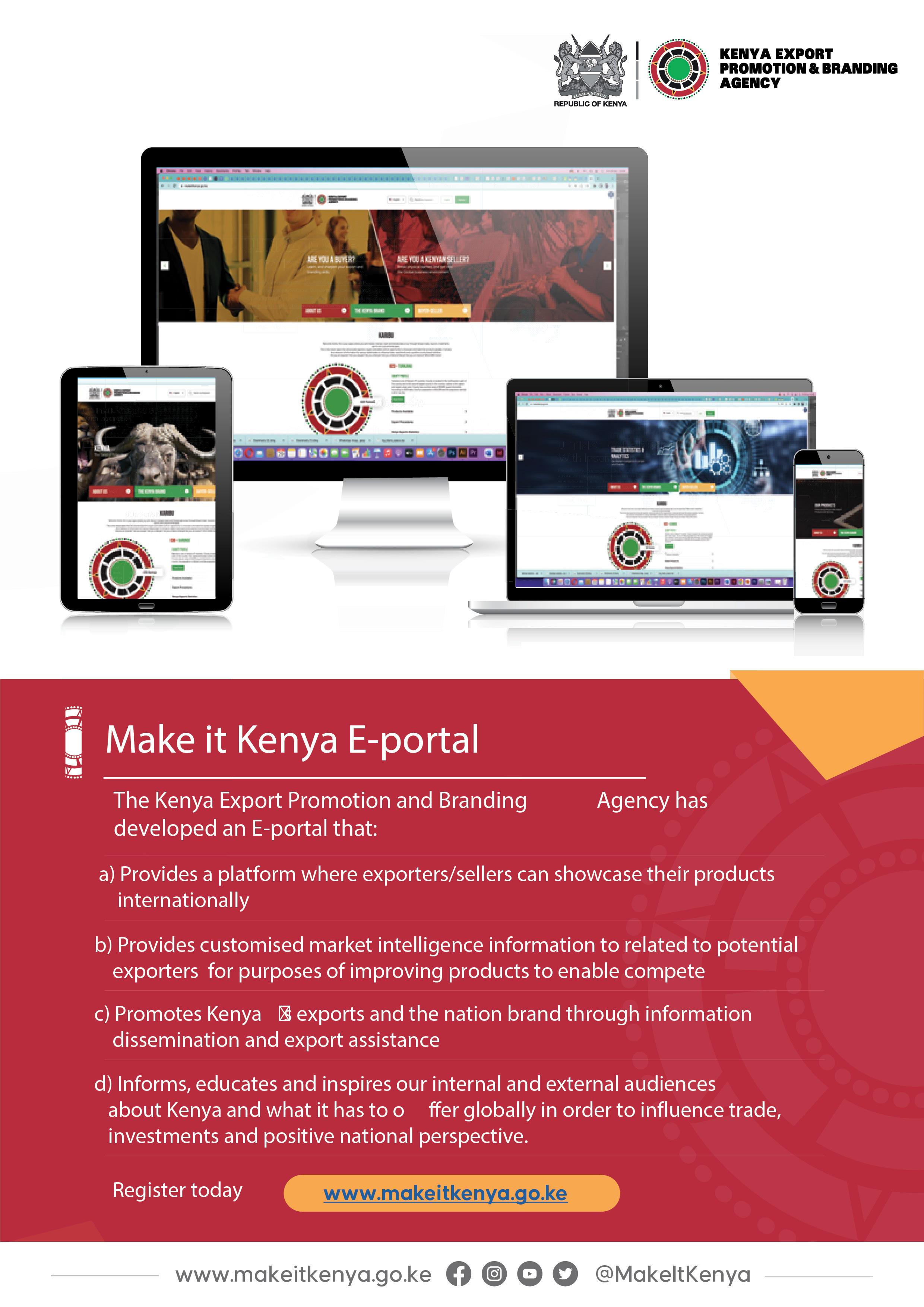
ARE YOU A BUYER? ARE YOU A SELLER?
Here is your platform
1. To interact and transact online
2. Access all information on products.
3. Check out product listings from all Kenya’s 47 counties
4. Information on which ones have more potential for export. NEW TO EXPORT TRADE? You now have export procedures for a range of products to di erent markets by a simple click.

Kenya Export Promotion and Branding Agency
1st & 16th Floors, Anniversary Towers, University Way P. O. Box 40247 – 00100 GPO Nairobi Kenya.
Tel. + 254 20 222 85 34-8
Cellphone: +254722 205 875 | +254734 228 534
Email: info@brandke.ke
Web: www.makeitkenya.go.ke
Kenya Investment Authority
UAP Old Mutual Towers, Upper Hill 14th and 15th Flr P.O. Box 55704-00200, Nairobi Tel: (+254) 730104200
Email: info@invest.go.ke www.invest.go.ke
The National Treasury
Treasury Building, Harambee Avenue
P.O. Box 30007-00100, Nairobi
Tel. +254 20 2252299
Email: ps@treasury.go.ke
Website: www.treasury.go.ke
Vision 2030 Delivery
Secretariat KUSSCO Centre, 2nd Flr, Upper Hill. P.O. Box 52301 - 00200, Nairobi
Tel: +254-20-272
20 30, +254-20-272 22 004
Email: info@vision2030.go.ke
Website: www.vision2030.go.ke
Ministry of Foreign Affairs
Old Treasury Building, Harambee Avenue
P.O Box 30551 – 00100 G.P.O NAIROBI, Kenya
Tel: +254 20 3318888
Email: info@mfa.go.ke
Website: www.mfa.go.ke
Ministry of Investment, Trade and Industry
Social Security House, Block A, 17th, 23rd Flr P.O. Box 30418-00100, Nairobi, Kenya
Tel: +254 20-2731531
Email: ps@industrialization.go.ke
Website: www.industrialization.go.ke
Agriculture and Food Authority
Head of Coffee Directorate
Coffee Plaza, 10th Floor Haile Selassie Avenue
P.OBox 30566 – 00100 Nairobi
Telephone: +254 710 670 026, +254 788 494 579, +254 20 334 2717
Email: coffeedirectorate@gmail.com, directorcoffee@agricultureauthority.go.ke
Website: coffee.agricultureauthority.go.ke
Presidential Delivery Unit
Physical Address: 24th Floor Kenyatta International Conference Centre
P.O. Box 40530-00100
Tel: +254-20-2217774/3
Email: pdu@president.go.ke
Website: www.delivery,go.ke
LAPSSET Corridor Development Authority
Chester House Building.
P.O. Box 45008 - 00100, Koinange Street, Nairobi
Tel: +254-(0)20-2218968
Website: www.lapsset.go.ke
Ministry of Petroleum and Mining,
P.O. Box 30009 – 00100, Phone: +254 (020) 2723101
Email: cs@petroleumandmining.go.ke
Website: www.petroleumandmining.go.ke
Ministry of Energy
Nyayo House, 23rd floor, Kenyatta Avenue
P.O. Box 30582 - 00100, Nairobi
Tel: (+254) 020310112
Cell: 0726 993 292, Email: info@energy.go.ke
Website: www.energy.go.ke
Kenya Plant Health Inspectorate Service
KEPHIS
Physical Address:
P.O. Box 49592-00100, Nairobi
Tel: 020 661 8000
Email : kephisinfo@kephis.org
Website: www. Kephis.org
KENTRADE
Physical Address: First Floor Embankment Plaza
Longonot Rd, Upperhill Hill,Nairobi
P.O. Box 36943 -00200, Nairobi
Tel: +254 (20) 4965000
Email: contactcentre@kentrade.go.ke
Website: www.kentrade.go.ke .
Kenya Tourism Board
Head OfficeKenya-Re Towers, Ragati Road
P.O. BOX
30630 – 00100 Nairobi,Kenya
Telephone: +254 20 2711 262Pilot No: +254 20 2749 000
Fax: +254 20 271 9925
Email: info@ktb.go.ke
Kenya Revenue Authourity
Physical Address: Times Tower Building, HaileSelassie Avenue
P.O. Box 48240 - 00100
Tel: +254 20 281 0000
Email: callcentre@kra.go.ke
Website: www.kra.go.ke
Immigration Department
Nyayo House 20th floor, Kenyatta Avenue/Uhuru Highway
P.O Box 30395 – 00100 Nairobi.
Tel: +254-20-2222022
Email; dis@immigration.go.ke Website www.immigration.go.ke
Kenya Private Sector Alliance
5th Floor, Shelter Afrique Building, Mamlaka Rd.
P.O. Box 3556-00100 Nairobi, Kenya
Phone +254 202730371|2|2727936|883 +254 720 340949|735 999979
Email: info@kepsa.or.ke
Kenya Association of Manufacturers
15 Mwanzi Road opp West Gate Mall, Westlands, Nairobi, Kenya
Email: info@kam.co.ke
Mobile: +254 (0) 722201368, 734646004/5
Telephone: +254 (020) 232481

Kenya National Chamber of Commerce and Industry
Heritan House, Off Argwings Kodhek
Phone: +254 20 3927000
Email: info@kenyachamber.or.ke
Fresh Produce Exporters Association of Kenya
New Rehema House, 4th Floor Westlands, Nairobi, Kenya
P.O. Box 40312-00100, Nairobi
Telephone: +254 020 516 0333
Email: info@fpeak.org
Kenya Flower Council Suite 12, 4th Floor, The Greenhouse Building, Adams Arcade, along Ngong Road
Tel. No: +254 20 2439523
Mobile: +254 733 639 523
Email: info@kenyaflowercouncil.org
Konza Technopolis Development Authority (KoTDA) Westlands, Capital West Business Centre 5th Floor, Opposite New Rehema House at the intersection of Rhapta Road & Lantana Road
P.O. Box 30519-00100
Nairobi, Kenya
Email: konza@konzacity.go.ke
Tel: +254(0) 204343013/4
Export Processing Zones Authority
Administration Building,Viwanda Road, off NairobiNamanga Highway, Athi River, Kenya
P.O. Box 50563, Nairobi 00200, Kenya
Email: info@epzakenya.com
Safaricom: 0709 537 000/ 0713-051172/3
Airtel: 0786-683222, 0733-683222
Telkom ISDN: 045-6621000
VoIP Lines: 020-7606040/3
Tel. + 254 20 222 85 34-8 Cellphone: +254722 205 875 | +254734 228 534 Email: info@brandke.ke Web: www.makeitkenya.go.ke


